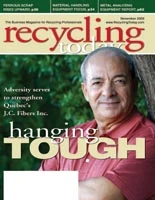COMPOSITE METALS IN THE MIX?
Automobile shredder operators would probably argue that they face a difficult task as it is sorting through the variety of materials used to build the average vehicle.
In the future, the task could be made even more difficult if researchers at DaimlerChrysler, Auburn Hills, Mich., successfully develop composite materials made from fused metal and plastic.
According to an article in the company’s HighTech Report, "Researchers at DaimlerChrysler . . . are taking a close look at hybrid materials consisting of thin, high-strength metal profiles and thermoplastics."
The "back-injection" process is described as "injecting plastic into the tool mold [so] a composite is formed in which the plastic closely surrounds the steel sheets."
The goal is to create hybrid materials that are 20 percent lighter and 20 percent cheaper than all-metal components.
THE NEPSI CHALLENGE
The individual in charge of trying to forge an agreement between the 48 negotiating parties taking part in the National Electronic Product Stewardship Initiative (NEPSI) is the first to admit the task has been arduous.
"NEPSI has been a unique challenge," Cat Wilt, NEPSI program director and University of Tennessee senior research associate, told attendees of the E-Scrap 2003 conference in October.
The challenging process, which began in 2001, may come to a head in December, when Wilt said a Dec. 9-11 meeting will probably determine whether an agreement on a method to finance an electronics recycling system will be possible.
The NEPSI participants, or stakeholders, consist of 15 product manufacturers, 15 representatives from government agencies and 18 other participants ranging from environmental groups to trade associations and retailers.
Wilt said the stakeholders have met eight times previously, in addition to holding numerous ad hoc meetings among some members and conducting countless teleconferences.
The group is working toward the formulation of a policy acceptable to electronics manufacturers, retailers, recyclers and the government agencies that oversee solid waste and recycling policy.
Wilt said the "hybrid model" that is emerging calls for an advanced recovery fee (ARF) to be enacted at the point of purchase for computers, monitors, TVs, keyboards and potentially printers and other electronics item.
This ARF would eventually be retired in favor of a partial cost internalization (PCI) process involving manufacturers and recyclers.
Although pleased with the agreement reached on this hybrid model, Wilt cautioned that several "deal breaking" snags may still prevent a document signed by all stakeholders from resulting at the December meeting. Among the potential stumbling blocks: finalizing the list of items subject to the ARF and collected in the system; agreement by involved parties over which PCI costs they must cover and whether they are able to; and whether the system can be enacted without federal legislation (and whether such legislation can be moved through Congress).
Wilt told attendees that if some form of agreement cannot come out of the Dec. 9-11 meeting in Chicago, she and several participants may be ready to quit. "There is no way we’re continuing [unless] there is considerable movement on the [deal-breaking] issues," she remarked.
E-Scrap 2003, organized by Resource Recycling magazine and sponsored by several recycling and recycling equipment companies, was Oct. 22-23 in Orlando.
REPUBLIC FILES UNDER CHAPTER 11
Republic Engineered Products LLC, Fairlawn, Ohio, has filed for bankruptcy reorganization, a step that could allow its Ohio steel mills and other facilities to keep operating.
In its filing, Republic has listed assets of $481 million and debts of $468 million as of June 30, according to a report in the Akron Beacon-Journal.
Republic started calling back shipping department employees Oct. 4 after suddenly closing down most operations Oct. 2.
"Under the circumstances, this filing was the only way for Republic to restore operations and preserve the business," says Republic Engineered Products CEO Joseph F. Lapinsky.
Republic has steel mills with furnaces in Canton and Lorain, Ohio, and rolling and finishing facilities in Canton, Lorain and Massillon, Ohio, as well as in Lackawanna, N.Y., and Gary, Ind. The company was formed in August 2002 when investment groups purchased some assets of the former Republic Technologies International.

Explore the November 2003 Issue
Check out more from this issue and find your next story to read.
Latest from Recycling Today
- Lux Research webinar examines chemical recycling timetables
- Plastics producer tracks pulse of wire recycling market
- Republic Services, Blue Polymers open Indianapolis recycling complex
- Altilium produces EV battery cells using recycled materials
- Brightmark enters subsidiaries of Indiana recycling facility into Chapter 11
- Freepoint Eco-Systems receives $50M loan for plastics recycling facility
- PET thermoform recycling the focus of new NAPCOR white paper
- Steel Dynamics cites favorable conditions in Q1





